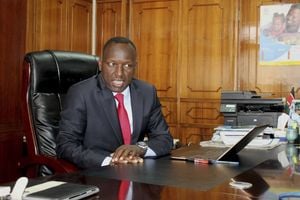
Pupils lift copies of new syllabus textbooks distributed by Kenya Literature Bureau in Kisumu on January 9, 2019.
The government appears to have backtracked on plans to fully privatize book publisher Kenya Literature Bureau (KLB), pointing to a long and complex journey of the privatisation programme.
Instead, the State will cede a portion of its shareholding in KLB, a senior official of KLB, the publisher’s outgoing chief executive officer Victor Lomaria has disclosed.
KLB is one of the state corporations lined up for privatization as the government moves to reduce the burden on the exchequer while raking in additional revenue from the sale of the parastatals.
“The issue of privatization came and KLB was one of the parastatals lined up for privatization…They did their analysis and said the market is mature, the government can take a walk and allow the private sector to control,” said Lomaria.
“Later when we sought for clarification they said, ‘…the government is not walking away we are only ceding a certain percentage to the privet sector,’” added Lomaria.
Because it is profitable, KLB is among the parastatals eligible for listing on the Nairobi Securities Exchange (NSE), as the listing rules require companies that want to go public to have been profitable at least once in the last five years.
Mr Lomaria explained that should the publisher receive the private sector capital; it could use the money to modernize its printing press.
He also wondered how KLB would keep on playing its role as “a publisher of last resort” as a private company.
“There are other areas other publishers would not go to because of the low or zero margins,” he said, noting that KLB is called upon to take such unprofitable ventures as a State body, for example, printing books for the SMEs or special needs.
The other state-owned publisher is the Jomo Kenyatta Foundation, which also gives scholarships to needy students.
The CEO, whose second and final term ends on Friday, said KLB has been run as efficiently as any other private firm, increasing its gross turnover to Sh3.45 billion in the fiscal year ending June from Sh2.3 billion in the year ending June 2017.
Within that period, the organization has paid the Treasury dividends amounting to Sh200 million, disclosed Lomaria.
The Treasury on November 27 made public the 2023 Privatization Programme, a month after the new law governing the process took effect.
Some 11 State-controlled entities with an asset value of more than Sh190 billion have been put up for sale in the program, the first since 2009 which had earmarked about 26 parastatals for privatization.
These entities include Kenya Pipeline Company (KPC), Kenyatta International Convention Centre (KICC), KLB, New Cooperative Creameries (New KCC) Limited, and the Kenya Seed Company.
The goal of William Ruto’s administration is not only to privatize government entities to consider a burden to the taxpayers but also to significantly reduce the budgetary support to commercial enterprises such as Kenya Power and firms like Kenya Airways.
Kenya has 248 State corporations, out of which 46 are commercial enterprises while 201 are non-commercial. KLB is a commercial enterprise that, according to Lomaria, has not been receiving disbursements from the exchequer.







